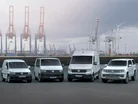E-mobility & Electrification Across the VWFS Fleet

Volkswagen Financial Services (VWFS) is the business division of the Volkswagen AG group, which promises to be ‘the key to mobility’. David Watts is the Fleet Product Manager for Electric Vehicles at VWFS Fleet. He has his eye on e-mobility and supports VWFS Fleet’s customers with expert consultancy, to help them reduce fleet emissions by making the transition to EVs.
Watts fell into the fleet industry by accident more than 25 years ago, starting out as a fleet supervisor following a career-ending injury that prevented him from joining the Army once he left university. His sustainability journey began when he took a career break and volunteered on a marine conservation project in Northern Borneo and took part in a volunteer dive recovery team in Ko Phi Phi following the 2004 Boxing Day Tsunami.
“On my return, I was able to combine my fleet industry experience with my interest in sustainability, which is when I began working for the Energy Saving Trust in 2006. In this role, I went on to map out the blueprint of today’s EV journey, working on the Trust’s groundbreaking Plugged-in Fleets initiative to make the case for EVs back in 2012. Since then, I have been a publicly strong advocate for EVs helping to support people making the transition.”
At VWFS Fleet, Watts supports customers in developing effective EV transition strategies that reduce emissions and help businesses to meet net zero targets.
“My role includes dedicated consultations with customers to help shape their sustainability strategies and overcome their specific challenges to ensure a smooth transition to EVs. I am also responsible for VWFS Fleet’s EVolve proposition and enhancements – including developing a number of free resources to support businesses on their route to switch, such as an EV Journey Planning Guide, EV Charging Guide and EV Transition Strategy Guide. I am also involved in Volkswagen Group’s work around electrification.”
VWFS Fleet’s e-mobility initiatives and challenges
Watts anticipates that in 2024 and over the coming years, one of the biggest challenges facing EVs is finding solutions to ensure electric light commercial vehicles (eLCVs) work for businesses so they can continue the momentum of their net zero journey.
“With the Zero Emission Vehicle (ZEV) mandate stipulating that 70% of new vans sold in the UK should be zero emission by 2030, the availability of new ICE vans is likely to decrease significantly in the coming years,” Watts explains. “However, a study last year found that eLCVs accounted for just 5.9% of total van registrations in 2022 — demonstrating the need for a significant acceleration in the electrification of LCVs to meet ambitious targets.”
Technology is continuing to advance across all areas of EVs, offering greater range and affordability. However, for LCVs to work for many fleets, there also needs to be consideration for how the vehicle’s battery will fare in powering different components, such as tippers or refrigerators, depending on the vehicle’s use. This is a key challenge, and one many manufacturers are already working to overcome quickly.
VWFS Fleet’s EVolve proposition supports fleets of all sizes with their EV transition across five key themes. These include:
Fleet analysis
“With our innovative tools and customer portal, businesses can get a full picture of their EV opportunity, assess EV readiness and track progress,” says Watts.
Vehicle choice
“Expert consultancy to support businesses in selecting the right make, model and type of vehicle for their business needs.”
Charging
“Working with expert partners to deliver home charging solutions and support businesses with their reimbursement strategies.”
Funding
“Helping customers identify the most cost-effective funding options for them, with solutions for leasing, salary sacrifice and flexible renting.”
Driver support
“Delivering EV roadshows to educate and support drivers in making the switch and providing a 24/7 365-day service to help keep your drivers safely on the road and protect businesses’ bottom line.”
VWFS Fleet's evolution in electric vehicle technology
As the VWFS Fleet continues its drive towards a net zero fleet, the technology behind EVs is continually advancing to make electric a feasible fuel type for different vehicles and driver profiles. This includes longer-range vehicles and larger vehicles.
Watts continues: “There are also significant developments in ways to make charging more accessible and affordable for those who are unable to charge at home, for example through community charging schemes, which allow drivers to ‘rent’ chargers from those in their local area at a lower cost of public charging.”
Bi-directional charging is becoming more accessible to offer more sustainable workplace charging solutions, where EVs can send power from the vehicle battery to the charger to balance spikes in demand and stabilise the power grid.
One specific focus for the future is around helping customers to reduce indirect, Scope 3 emissions. With the Salary Sacrifice car scheme, employees choose a brand new car from VWFS and at the end of the contract, they can exchange it for a new one or buy it at a competitive price. This offers all the benefits of a company vehicle, for those who wouldn’t usually qualify.
“Through the introduction of Salary Sacrifice car schemes, this will unlock significant business and employee savings, at no cost to the business.”
Over the next 12 months and beyond, VWFS Fleet will continue to support fleets of all sizes at every stage of their transition.
******
Make sure you check out the latest edition of EV Magazine and also sign up to our global conference series - Sustainability LIVE 2024
******
EV Magazine is a BizClik brand



